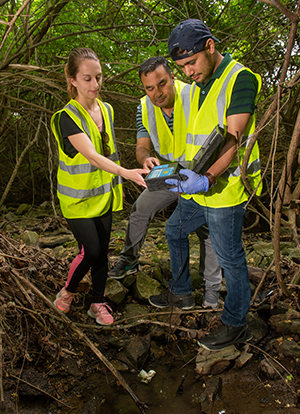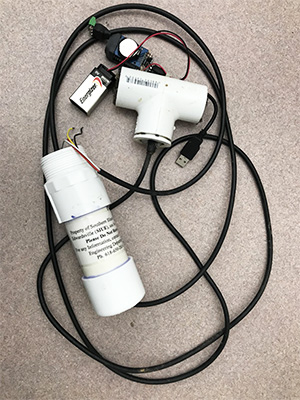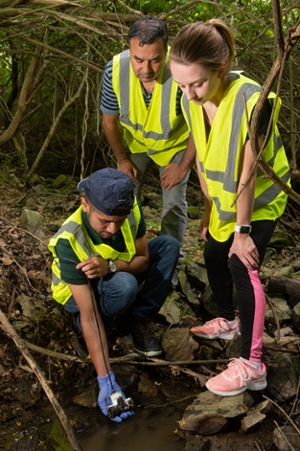 Research is being conducted everywhere we look, with curiosity and the pursuit of new knowledge offering an endless array of opportunities to generate important information and expand horizons.
Research is being conducted everywhere we look, with curiosity and the pursuit of new knowledge offering an endless array of opportunities to generate important information and expand horizons.
One such example is the continuous monitoring of salt concentration in local water bodies in order to study effect on ecosystem, a research project led by Southern Illinois University Edwardsville School of Engineering’s Rohan Benjankar, PhD.
In fall 2018, Benjankar and his research team comprising two students, deployed 35 sensors in rural streams, urban drains and sides of roadways throughout Madison and Macoupin Counties, and on SIUE’s campus. The sensors measure electrical conductivity every 15 minutes, offering a cost-effective way to collect continuous data.
“My overall research focuses on interaction between hydrological processes and ecosystems and restoring ecosystem processes, which are degraded due to human activities,” Benjankar explained. “Winter road maintenance activities using excessive salt may degrade water quality and ecosystem health.  It is important to know how much is contributed by winter road maintenance, because salt concentration is also a result of other activities such as industrialization, wastewater treatment and its natural occurrence in certain geological areas.”
It is important to know how much is contributed by winter road maintenance, because salt concentration is also a result of other activities such as industrialization, wastewater treatment and its natural occurrence in certain geological areas.”
Civil and environmental engineering graduate student Ravin Kafle, of Nepal, and May 2019 civil engineering graduate and former Undergraduate Research and Creative Activities (URCA) assistant Vicky Wieseman, of Worden, have worked alongside Benjankar.
“Working closely with a highly qualified professor has been a great opportunity,” said Kafle, who is specializing in water resources engineering. “Salinity in streams is a global issue that affects aquatic and terrestrial ecosystems. This research project has helped me become familiar with developing experimental methodology for field work and learn the role of salt concentration on ecosystems.”
“I am fascinated by the environment and water sources,” added Wieseman. “This research experience has positioned me for  future success by allowing me to see what it is like to go into the field, and collect data to later be analyzed and interpreted. It’s deepened my knowledge in environmental engineering studies.”
future success by allowing me to see what it is like to go into the field, and collect data to later be analyzed and interpreted. It’s deepened my knowledge in environmental engineering studies.”
This spring, Benjankar and his team collected all 35 sensors, so the work of collecting and analyzing the data will commence. If his approach proves successful, Benjankar notes it will offer a less expensive technology to capture salt concentration in water bodies throughout the year, not only during seasons when salt is applied to maintain road safety.
He expects the research to offer new knowledge to the general public, and the data collected may help Department of Transportation professionals’ in their decision making when considering use of salt for winter road maintenance.
Photos: The SIUE School of Engineering research team, including (L-R) Vicky Wieseman, Rohan Benjankar, PhD, and Ravin Kafle use a Hatch conductivity meter to measure salt concentration in the field to verify sensor measurements.
The complete set of instruments includes a sensor and data logger, which is energized by a 9-volt battery for continuous measurement and to store data. The data logger is placed inside a one-inch polythene (partially water tight) tube to protect from adverse weather and other conditions.
SIUE School of Engineering’s Rohan Benjankar, PhD, (middle) and his research team remove a sensor from a stream on campus. Graduate student Ravin Kafle (left) and May 2019 graduate and former URCA assistant Vicky Wieseman have assisted in the work monitoring salt continuously in local water bodies.